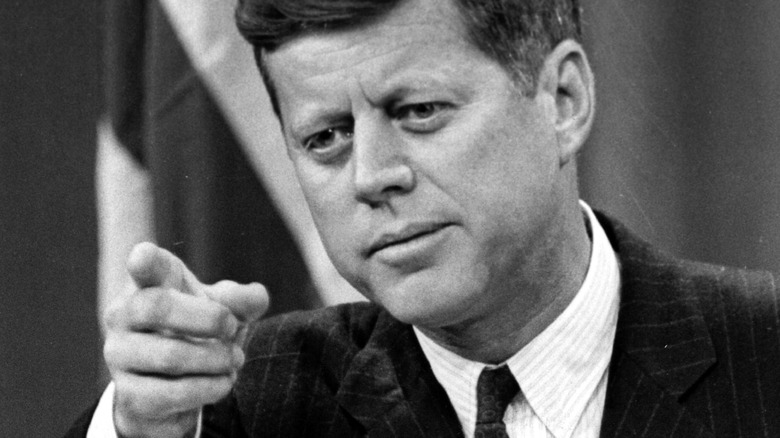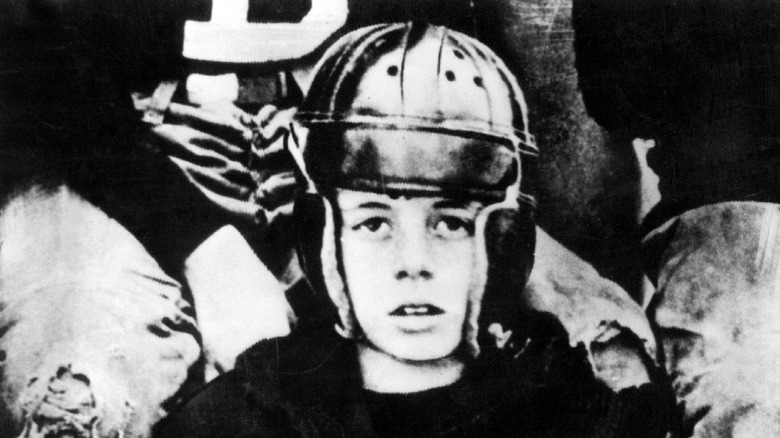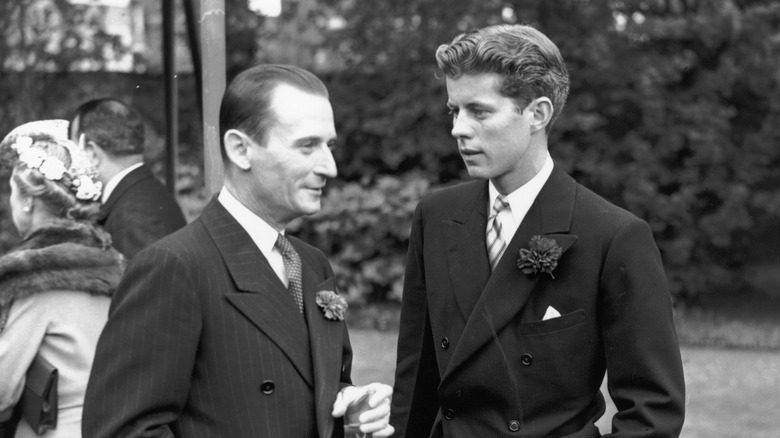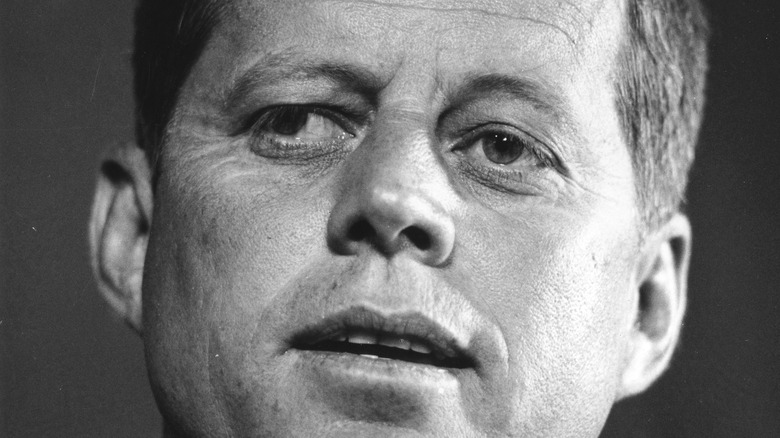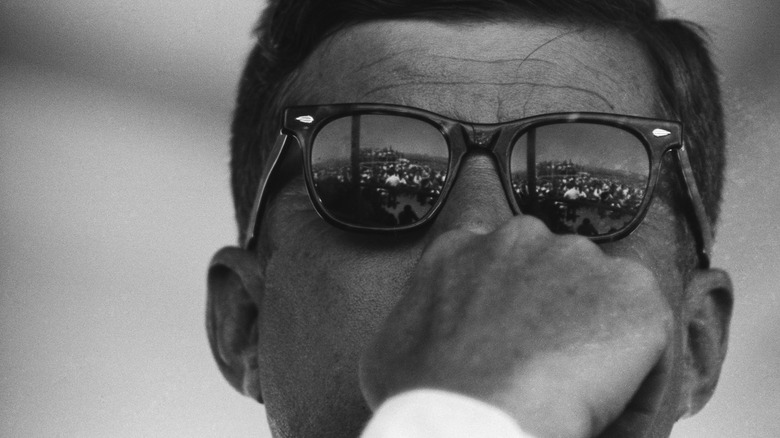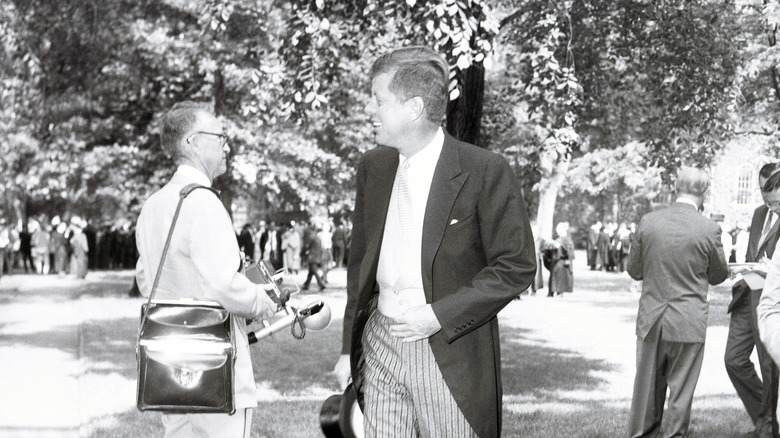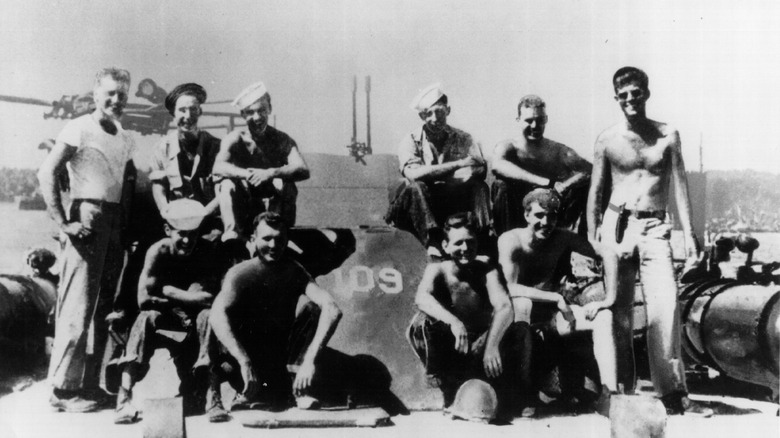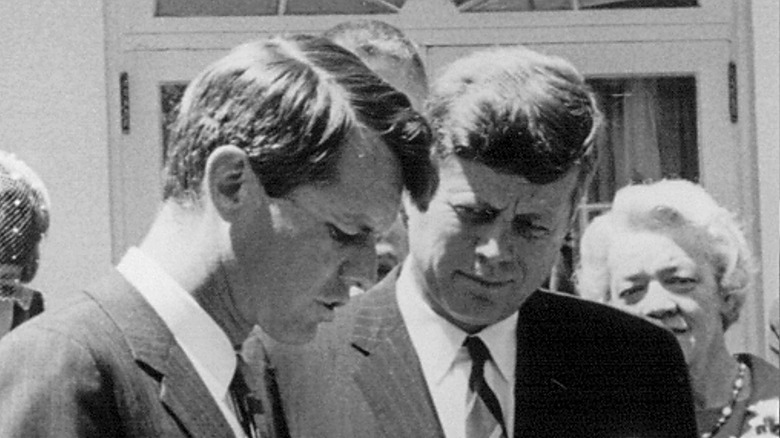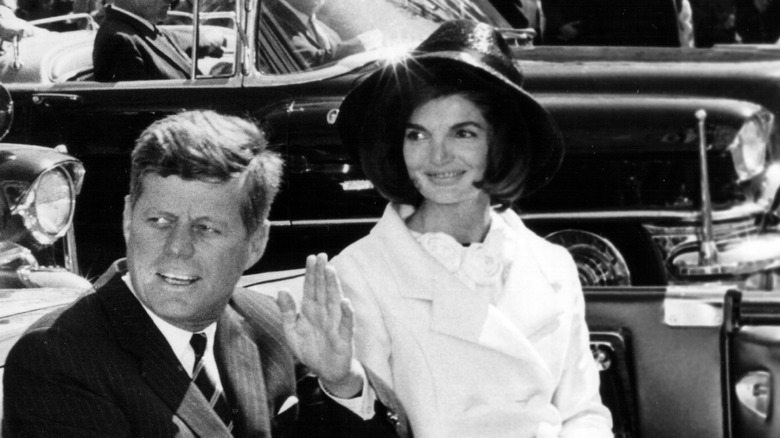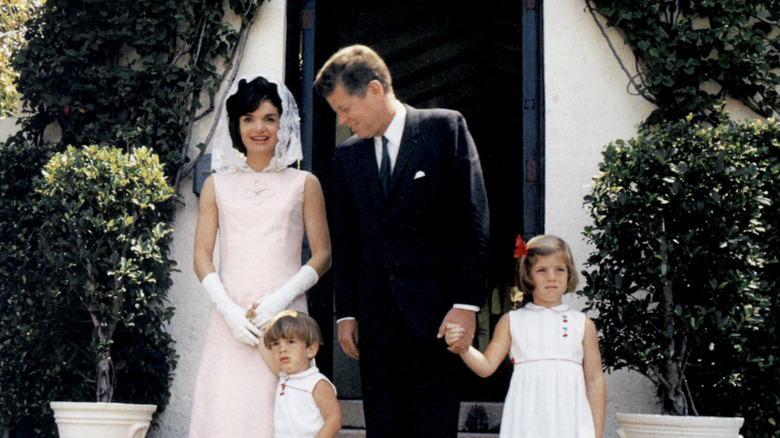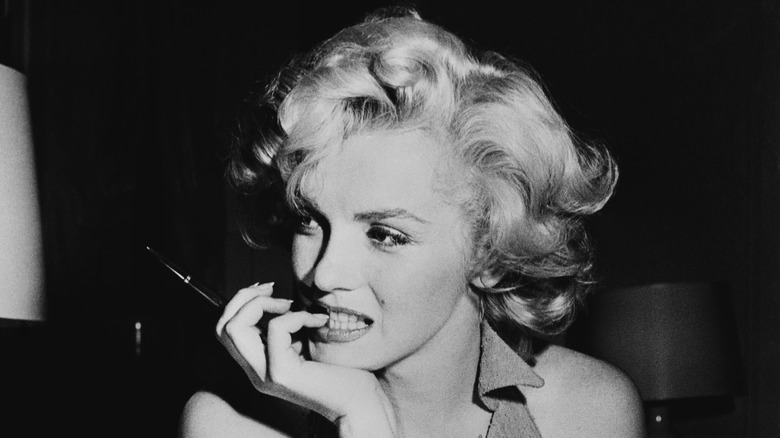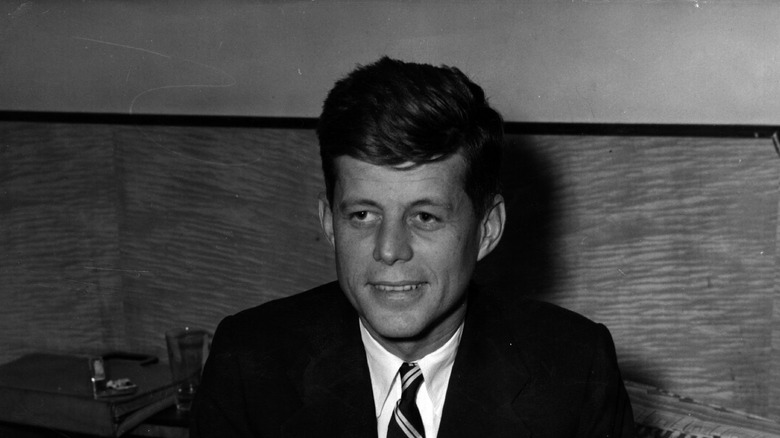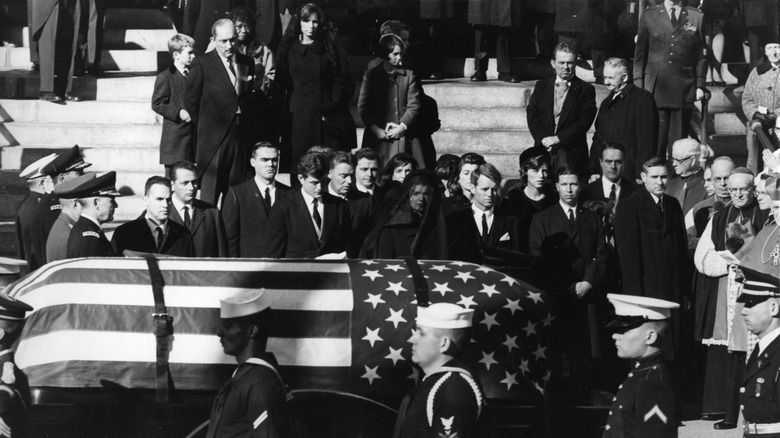What JFK's Private Life Was Really Like
John F. Kennedy has been immortalized as an icon of charismatic, clean-cut New England charms. From his affluent Massachusetts upbringing and his Ivy League education to his triumphant presidency and his alleged affairs with glamorous starlets, Jack presented an image of good looks, good health, and good social graces. But part of this image was an illusion.
The former president is noted for his open relationship with the media. He and Jaqueline Kennedy appeared in magazine spreads and inspired trends in popular culture. Jack was also the first president to broadcast his press conferences live on television, according to the American Chronicle. But his private relationships — with his wife, his siblings, and his rumored lovers — were rife with tragedy and scandal. In a letter to the writer Fletcher Knebel, Jackie wrote, "I would describe Jack as rather like me in that his life is an iceberg. The public life is above the water — and the private life — is submerged . . ." (via Vanity Fair). Here's what is known about the aspects of JFK's private life that were often obscured from public view.
Political pressures were placed on JFK from an early age
On May 29, 1917, John Fitzgerald Kennedy was born in the master bedroom of a nine-room house on Beals Street in Brookline, a leafy suburb of Boston, per the National Park Service. He was the second of nine children born to Rose and Joseph Kennedy. Both of John's parents were involved in public service; Rose as a socialite and philanthropist, and Joseph as an international businessman. From Rose, John and his siblings learned the importance of social graces. From Joseph, they were instilled with a competitive spirit and a drive to impress.
According to Brittanica, the Kennedy children often engaged in friendly competition through tennis matches, touch football, sailing races, and wrestling. Still, their parents' highest expectations for their children were that they would grow up to marry well and live lives of public service. They nudged their children to start reading The New York Times at an early age in order to successfully engage in political discussions, rather than small talk, at the dinner table. These activities and expectations set the foundation for many of the Kennedy brood's later decisions.
JFK was a notorious prankster at his prestigious boarding school
John F. Kennedy attended high school at the prestigious Choate Rosemary Hall boarding school in Connecticut. According to Reuters, the school's headmaster, George St. John, chided Kennedy and his friends during a school assembly for a prank they'd pulled and called them "muckers," a slang term used in reference to Irish immigrants who shoveled horse manure. This gave Kennedy an idea, and he named his boisterous friend group, which soon grew to 13 members, the "Muckers," per a Choate bulletin.
One of the first plans hatched by the "Muckers" involved piling horse manure in the school gym. "George St. John got wind of it and even though the prank never was actualized, it was enough that they would even consider such a thing, so he threatened to expel them all," said the school's archivist, Judy Donald (via Reuters). St. John backtracked on the expulsion after a six-hour meeting with Kennedy's father, per the Choate bulletin. "What makes the whole problem more difficult is Jack's winning smile and charming personality," wrote Earl Leinbach, Kennedy's former dorm housemaster (via Town & Country).
The Muckers have also been credited with blowing up a Choate toilet with a cherry bomb, but according to Donald, that particular prank was executed by another student years after Kennedy had graduated.
JFK hid his many health issues
John F. Kennedy's medical issues haunted him throughout his life, but he kept the extent of them hidden from the public. According to The Atlantic, Kennedy contracted a life-threatening case of scarlet fever when he was 2 years old, and had to spend over two months recovering in a hospital in Maine. In the years that followed, he suffered from illnesses including bronchitis, chicken pox, measles, mumps, and whooping cough.
At the age of 13, Kennedy came down with an undiagnosed illness that made him feel dizzy and tired. He lost weight and didn't grow. After he collapsed due to abdominal pains, the condition was diagnosed as appendicitis, but an appendectomy failed to quell his mysterious symptoms.
A variety of infections and health scares continue to plague him into adulthood. He suffered from Addison's disease, a hormonal deficiency that affects the adrenal glands and can be life-threatening. The Lyndon B. Johnson campaign told the press of this condition during the 1960 Democratic primaries, but the Kennedy campaign denied it. Kennedy also suffered from severe — and often debilitating back pain throughout his adulthood.
JFK took controversial cocktails of drugs
John F. Kennedy had a complicated relationship with drugs, but unlike many cultural icons of his time, he turned to them to treat genuine medical ailments. But according to The Atlantic, it is possible that the steroid treatments Kennedy received for his intestinal troubles early in life may have caused or worsened the Addison's disease and severe back pain he later experienced.
During times of career stress, such as the Bay of Pigs Invasion and the Cuban Missile Crisis, Kennedy was on a cocktail of drugs that included antibiotics, antihistamines, anti-psychotics, anti-spasmodics, painkillers, and steroids, as noted by historian Robert Dallek (via The New York Sun). In 1960, he was introduced to Max Jacobson, known as "Dr. Feelgood," who prescribed amphetamines mixed with wild cocktails of vitamins, hormones, and materials taken from animals like organ cells and placenta. Jacobson often traveled with the president, sometimes "treating him" every day. Those around Kennedy, including his brother Robert and the Secret Service, were wary of the so-called doctor. "I don't care if it's horse piss," Kennedy told them (via The New York Sun). "It works."
According to New York magazine, Kennedy had stopped taking the drugs for his back issues and was exercising his back muscles instead by 1963, putting him "probably in the best health he had ever been in on the day he died."
JFK kept busy during his Harvard years
While attending Harvard University, John F. Kennedy got involved in student life, but wasn't always the star of the campus. According to Boston magazine, he even once ran for class president in 1936, but fell short on votes and failed to make it to the primary ballot. Instead, he became chairman of the school's Smoker Committee, which planned and hosted student social events. In May 1938, Kennedy organized a "Smoker" party that involved live jazz and "free food, tobacco, and ginger ale."
Kennedy was also involved in athletics, though his health issues presented obstacles. His freshman football coach said that Kennedy was "the most adept pass catcher" but "his lack of weight was a drawback" (via Boston). Kennedy made the freshman and junior varsity teams, but he reportedly suffered from a spinal injury that likely contributed to his lifelong back problems. Kennedy also swam competitively for two years, but his frequent sickness and low weight kept him from excelling.
Between academic years at Harvard, Kennedy traveled across the Atlantic to visit his global ambassador father. These visits fueled the younger Kennedy's interest in global affairs and international relations. During one visit, Kennedy busied himself visiting the American survivors of a sunken ship in Scotland, and was several days late for the start of his Harvard semester as a result.
JFK came face-to-face with mortality while serving in the Navy
Despite his back issues, John F. Kennedy took advantage of his father's connections to his advantage and landed a spot in the U.S. Navy, per Naval History and Heritage Command. As an Ensign in the U.S. Naval Reserve and an employee of the office of Naval Intelligence, Kennedy helped prepare intelligence briefings for top Navy officials.
Following a string of promotions and trainings, he sought combat duty as a replacement officer and began sailing the seas with fellow troops. On the first night of August 1943, Kennedy was commanding a vessel called the PT 109, with 12 fellow Navy troops onboard, when a Japanese destroyer unknowingly struck the ship. Kennedy landed on his bad back, and the ship was torn apart and set aflame. Kennedy got to work rescuing his fellow troops in the water, which took around three hours, but two men were killed in the collision.
Kennedy also mourned the death of his childhood friend, Marine Corps Second Lieutenant George Houk Mead Jr., who had been killed in action in 1942, according to Edward J. Renehan Jr.'s "The Kennedys at War: 1937 – 1945." The following year, Kennedy's older brother, Joseph Jr., was also serving in the U.S. Navy, as a naval aviator, per History. The older Kennedy was on a dangerous mission to direct a bomber onto a German rocket-launching site when the explosives detonated early, killing him at the age of 29.
JFK wasn't close with Bobby Kennedy until later in life
In the large Kennedy brood, John F. Kennedy was older than his brother, Robert F. Kennedy, by eight and a half years. According to the Boston Globe, the age gap between John — "Jack" — and Robert — "Bobby" — kept them from being close to one another in their respective formative years.
Then, in 1951, their father, Joe, insisted that Jack invite Bobby on a political trip to the Middle East. Jack reportedly complained that Bobby would be "a pain in the ass." But on the trip, when Jack's Addison's disease shot his temperature up to 107 degrees, Bobby arranged to have his brother flown to a military hospital in Japan and sat by his bedside. Jack wasn't expected to survive, but Bobby's quick action ultimately saved his brother's life. In 1955, when Jack's wife, Jackie, had a stillborn daughter, she was unable to reach her husband, who was away on business. Bobby rushed to Jackie's side, comforted her, and made all of the necessary arrangements.
Jack and Bobby learned that they shared the ambition instilled in them by their father, as well as intelligence, ironic humor, and toughness. Bobby became Jack's right-hand man in the political realm. He took charge of managing Jack's 1952 run for Senate, which turned out to be victorious. "As much as any single person alive," said Larry Tye, author of "Bobby Kennedy: The Making of a Liberal Icon" (via WBUR), "it was Bobby Kennedy who made Jack Kennedy president."
JFK and Jackie Kennedy had an 'atypical' marriage
In 1952, John F. Kennedy met Jacqueline Bouvier, a journalist for the Washington Times-Herald, at a friend's dinner party, per Honey. Sparks flew between the pair immediately. "My brother really was smitten with her right from the very beginning when he first met her at dinner," said Ted Kennedy, Jack's youngest brother, as quoted in Sarah's Bradford's "America's Queen: The Life of Jacqueline Kennedy Onassis."
According to Honey, Jack saw Jackie as a challenge, and "there was nothing Jack liked better than a challenge." Jackie saw him as a potential heartbreaker, but she thought "such heartbreak would be worth the pain." They were engaged by the summer of 1953, and they married that September.
"I know everyone says married couples should never separate — as you get off the same wave length, but I think it is usually good when we go away from each other as we both realize so much," Jackie wrote in a letter to Jack five years into their marriage. "You are an atypical husband — increasingly so in one way or another every year since we've been married — so you mustn't be surprised to have an atypical wife. Each of us would have been so lonely with the normal kind."
JFK and Jackie Kennedy ran into complications in having children
One of the darkest shadows on the marriage between John F. Kennedy and Jacqueline were the traumatic experiences she faced in childbirth. According to Vanity Fair, Jackie suffered a miscarriage in 1955. She became pregnant again in 1956, and went into labor while Jack was sailing in Italy. The baby — a girl who would have been named Arabella — was stillborn. In 1957, the Kennedys welcomed a daughter named Caroline. After giving birth to a son named John in 1960, Jackie suffered from postpartum depression for months. A couple of years later, Jackie was pregnant for the fifth time.
On August 7, 1963, some 20 years after Jack's near-death naval voyage, Jackie went into premature labor on Cape Cod. The baby — a son named Patrick — was born five and a half weeks early, weighed less than five pounds, and was suffering from respiratory distress syndrome. The doctors said he had a 50-50 chance of survival. Patrick died just two days after he was born. Jack's secretary, Evelyn Lincoln, called Patrick's death "one of the hardest blows" of the president's life.
Rumors continue to swirl about JFK's alleged affairs
Another shadow on the Kennedys' marriage was John F. Kennedy's alleged extramarital affairs, including the highly publicized one with Marilyn Monroe, who famously sang him a sultry rendition of "Happy Birthday" at a fundraiser in 1962. In the 1997 book "The Dark Side of Camelot," Seymour Hersh wrote that Monroe's "instability posed a constant threat" to Kennedy (via People). Conspiracy theories have swirled about the Kennedy family's involvement in Monroe's 1962 overdose. The star was also rumored to have had an affair with the president's younger brother, Bobby, per Honey.
According to CNN, Kennedy is also rumored to have had affairs with various women who were employed at the White House, including a young intern named Mimi Alford; Jackie Kennedy's secretary, Pamela Turnure; and two other secretaries, Priscilla Wear and Jill Cowen, who were nicknamed "Fiddle" and "Faddle."
Another one of Kennedy's rumored lovers was a Swedish aristocrat named Gunilla Von Post, who later auctioned off letters from the president and wrote a memoir about their supposed six-year affair, titled "Love, Jack." A woman named Judith Exner, who reportedly had ties to the Mafia, claimed she had broken things off with the president in 1963, and that she had had an abortion the same year. Kennedy also allegedly had an affair with Mary Pinchot Meyer, a painter who was previously married to a Central Intelligence Agency official. Meyer was shot dead in 1964, almost one year after Kennedy was assassinated, and no perpetrator was ever convicted for the crime.
JFK's friendship with his gay best friend, Lem Bellings, sparked further speculation
John F. Kennedy met Kirk LeMoyne Billings, known as Lem, when he was in high school, per the JFK Library. According to Public Seminar, the pair became friends at Choate boarding school and then moved in together before embarking on three decades of friendship. Billings, who was gay, reportedly once admitted to making a pass at Kennedy when they first met. Some reports claim Kennedy rebuffed him and the two became friends instead, while others, including "The Kennedys in Hollywood" writer Lawrence Quirk, claimed Billings was not turned down. A New York Daily News writer wrote in 1996 that the two boys "engaged in the kind of sexual experimentation not unknown at all-boys boarding schools" (via Public Seminar).
"The bond between Jack and Lem grew to be so tight that they really had little need for friendships with other boys," journalist David Pitts wrote of the first few years of the friendship in his 2008 book "Jack and Lem." When Kennedy and Billings lived apart while the former was at Harvard, they exchanged letters and reunited to travel together. The pair remained close throughout Kennedy's life, even during his presidency, when Billings lived part-time in the White House. Billings was seen as a peripheral member of the Kennedy family, and Robert Kennedy even named his son Michael LeMoyne Kennedy.
"Because of him, I was never lonely," Billings once said (via Public Seminar). "He may have been the reason I never married."
Premature death plagued the Kennedy family
John F. Kennedy was assassinated while riding in his motorcade on November 22, 1963. He was 46 years old. Although horrific, such a tragedy was not unheard of in the Kennedy family. In addition to the hardships he and Jackie Kennedy faced when trying to have children, premature death had also befallen two of Jack's siblings before him. Jack's eldest brother, Joseph P. Kennedy Jr., was just 29 years old when he tragically died on a naval aircraft in 1944. Four years later, his older sister, Kathleen "Kick" Kennedy, faced a similar fate.
According to People, Kick's devout Catholic mother threatened to cut her off from the family after she revealed her affair with the married Protestant Earl Peter Wentworth Fitzwilliam. In 1948, Kick and Peter arranged to meet with her father, Joseph, in Paris to ask for his help. When they boarded a plane to France, the pilot insisted the weather conditions made it dangerous to fly, but the Earl insisted they take off immediately. The plane crashed, killing Kick, Peter, the pilot, and a navigator. Kick was 28 years old.
Just as Kick and Joseph Jr. had both died in plane crashes, Jack and Robert Kennedy were both shot dead in what appeared to be politically motivated assassinations. Five years after Jack's death, Bobby was celebrating his win of the 1968 California presidential primary at Los Angeles' Ambassador Hotel when he was shot multiple times. He was pronounced dead the following day, at 42 years old, per History.
